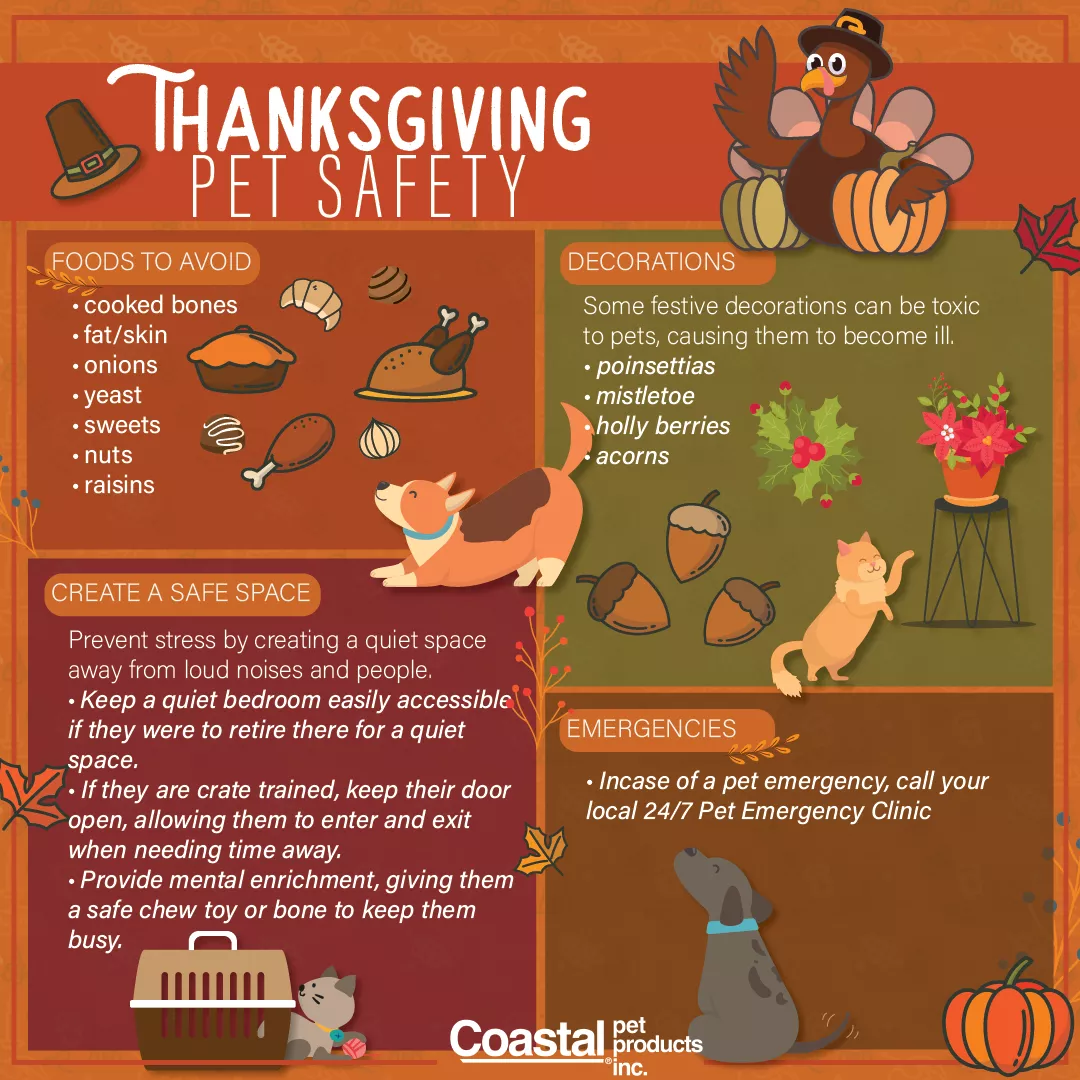With the holiday season upon us, Coastal Pet would like to remind you how to keep your pets safe during any holiday gathering. Keep these safety tips in mind when having friends and family around your pets.

Foods to Avoid
With friends and family gathering around the table, be sure to keep your begging pets away from the feast. Holiday dishes may cause more harm than good as they may contain potentially toxic ingredients.
Cooked Bones
Cooked bones should never be given to your pet as they can easily break and splinter as your pet chews on them. Once these bones are swallowed, they can cause damage to the gastrointestinal tract. According to the U.S. Food and Drug Administration, between November 1, 2010 and September 12, 2017, 90 dogs were reported as becoming sick after eating commercially available smoked or baked bone treats.
Fatty Foods & Skin
A major cause of pancreatitis is a high-fat diet. Pets who intake high-fat dog food or other fatty foods can cause their pancreas to become inflamed. To avoid an emergency vet visit, keep foods that are high in fat, like the skin from your food, away from your furry family member.
Onions
Onions can be toxic to a pet’s health. If your pet ingests too much of an onion it can cause damage to their red blood cells, which could lead to internal organ damage, organ failure, or even death.
Yeast
Yeast packets or raw dough can be potentially deadly. If a pet consumes raw dough, the yeast can rise and expand inside their stomach, causing bloat, medically known as Gastric Dilatation Volvulus (GDV). As the yeast ferments, it produces ethanol, which can be absorbed into your pet’s bloodstream and can cause alcohol poisoning.

Sweets and Chocolate
Chocolate can be very toxic to your pet if they ingest it, as it contains a chemical known as methylxanthines, which is found in cacao seeds. This chemical can cause vomiting, diarrhea, seizures and possible death. Depending on your pet’s weight, type of chocolate, and amount ingested, hospitalization may be required.
Xylitol is extremely toxic for pets. Xylitol is used as a sweetener in candy, baked goods, and nut butters. Xylitol is toxic because it causes an increase of insulin, resulting in a profound drop in blood sugar.
Nuts
While we may allow out pets to have peanut butter, some nuts can be toxic for our pets to eat. Nuts are high in fat and can cause your pet to have an upset stomach or could increase the chances of pancreatitis.
Raisins
Grapes and raisins are very toxic to our pets. It is not known what toxic substance grapes contain, but they can be life threatening, causing kidney failure.
Your festive decorations may be dangerous for your pet.
Poinsettias
These holiday plants are only “mildly toxic” to our pets, according to PetMD. These plants contain the chemical called diterpenoid euphorbol esters. If your pet were to ingest this plant, symptoms include irritation of the mouth, stomach, or skin.
Mistletoe
According to the Pet Poison Helpline, mistletoe poisoning can result in mild signs of gastrointestinal irritation.
Holly Berries
This holiday plant can be toxic to your pets if consumed, resulting in severe gastrointestinal irritation.
Acorns
These oak tree nuts contain tannins and other chemical compounds that cause upset stomachs in our pets. Quercus poisoning can also occur if your pet were to eat oak leaves. Be on the lookout when walking your pet or leaving them outside unattended.
Resources:
PetMD.com
ASPCA.org
Vets-Now.com
Petpoisonhelpline.com
VCAhospitals.com
AKC.org
Dogtime.com

